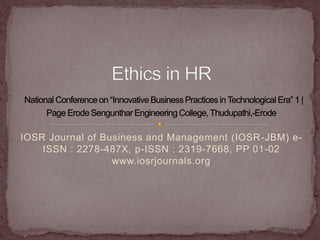Ethics in hr assignment
- 1. IOSR Journal of Business and Management (IOSR-JBM) e- ISSN : 2278-487X, p-ISSN : 2319-7668, PP 01-02 www.iosrjournals.org
- 2. Human Resource Management is a business function that is concerned with managing relations between groups of people in their capacity as employees, employers and managers.
- 3. Off-shoring and exploiting ‘cheap’ labour markets Using child labour Longer working hours Increasing work stress
- 4. 1. INCREASED JOB INSECURITY short-term and temporary conditions of employment. fear of job loss due to outsourcing . increased stress. imbalance of power between management and workforce. 2. INCREASE IN SURVEILLANCE AND CONTROL electronic surveillance of work patterns. 3. DE-REGULATION Deregulation is the practice of lightening the policy burden on the Human Resources (HR) department and at the same time, delegating HR authority to the line managers
- 5. In recruitment and selection: ensure that all assessment measures are fair and just. In reward management: ensure fairness in allocation of pay and benefits. In promotion and development: ensure equal opportunities and equal access. Ensure a safe working environment in both for all employees. Ensure that procedures are not unduly stressful, and that the needs of employees work–life balance are not compromised. When redundancies occur, to be fair and just in handling
- 6. Breaches of ethics in human resources can lead companies into a world of legal trouble, in both the civil and criminal arenas. Breaches of ethics in the HR department are more likely to be reported by victims to the than those committed in other areas, such as product development or accounting. Companies with comprehensive ethics programs in place can avoid costly trouble regarding discrimination and hostile-work-environment issues, resulting in lower costs for litigation and out-of-court settlements.
- 7. In the business world, legal trouble can introduce additional challenges to employers, as news outlets and ethics watchdog organizations spread the word about companies' misdeeds. Discrimination issues, sexual harassment and unfair employment policies can land companies on the front page of consumer- or business focused publications, damaging a company's reputation among consumers, potential strategic partners and potential future employees. Gaining a reputation as an ethical employer can help to attract the top talent in your industry from a wider area, as employees seek to find the most beneficial employment relationships they can. The opposite holds true, as well; if job applicants see your company as an unethical employer, the most skilled, experienced, creative and productive applicants are likely to put their resumes in elsewhere.
- 8. Treating employees ethically can garner long-term employee trust and loyalty, which conveys a range of distinct benefits to employers. Loyal employees gain more experience working with their employers, allowing them to master production processes and more fully understand the inner workings of the firm. This can increase employees' productivity and efficiency over time in addition to keeping recruiting and training costs under control. Sellers of consumer goods can gain marketing advantages from loyal employees, as well. Loyal employees often act as champions for a company's products, purchasing goods from their employer and spreading positive word-of-mouth advertising to friends, family and acquaintances over the years.
- 9. A solid reputation as an ethical employer does not happen on its own. Ethics-conscious business owners put comprehensive ethics programs in place to display a firm commitment to ethics in every area of business, including human resources. Put HR ethics policies in place regarding discrimination, sexual harassment and the treatment of employees, and put each of your managers and supervisors through ethics training programs to make sure they are fully aware of your expectations. Most importantly, lead by example in your organization to create a culture of mutual respect and dignity, where ethical decision-making is valued and rewarded.
- 10. HR systems are the key to the development and maintenance of Ethical culture. One of the steps HR managers can take is to focus on how ethics and values fit into the design of key systems such as performance management and reward systems. HR managers can integrate accountability for ethics and values into performance management systems so that implementing ethical values is weighted substantially in promotion and compensation decisions. Overall HR and Ethics managers must focus on how ethical systems fit together and align in support of ethical conduct, a common goal.
- 11. Pavithra.L Veena.K Priyanka.K
